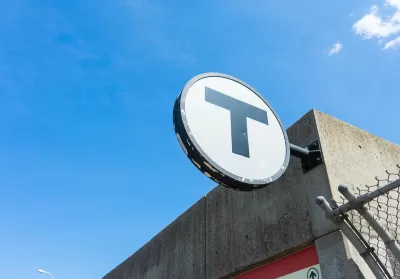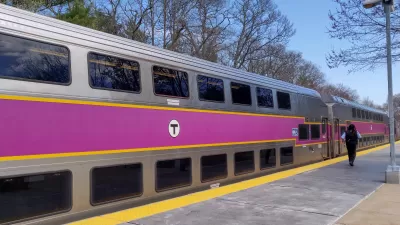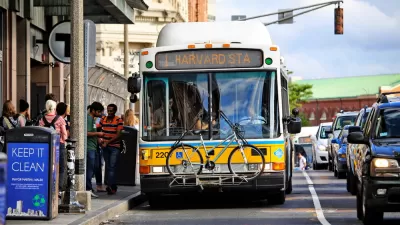The Massachusetts Bay Transportation Authority will electrify the 9 mile Fairmount Line, the shortest of their 12 commuter rail lines, using battery-electric multiple units. The first BEMU trains are projected to be operating in early 2028.

AASHTO Journal reported on Sept. 13 that the “Massachusetts Bay Transportation Authority – a division of Massachusetts Department of Transportation – recently signed off on a $54 million plan to introduce battery-electric multiple unit or BEMU trains to the Fairmount Commuter Rail Line. The first of those BEMU trains are scheduled to go into operation in early 2028.”
Keolis Commuter Services, the company that operates MBTA commuter rail lines, will begin the design and procurement process with the goal of delivering enough BEMU trains to operate 20-minute train service along the line.
Related:
- Boston Commuter Rail Recovering Rapidly, June 5, 2024
- Is it Fair to Blame Commuter Rail Woes on Private Operators? November 28, 2016
According to Wikipedia, the 9-station Fairmont line runs mainly “within Boston, running southwest from South Station through the neighborhoods of Dorchester, Mattapan and Hyde Park,” and “a short portion in Milton.”

“BEMU trains are powered by on-board batteries that are recharged by overhead catenary wires. Instead of locomotives pulling passenger cars, the batteries and motors will be integrated into four-car fixed sets,” adds AASHTO Journal.
An MBTA press release dated July 25 on the MBTA board's approval of the project indicates that catenary exists at South Station where the BEMUs would be recharged. Streetsblog Mass reported rather critically on the project in March, noting the agency's overall approach to electrification.
In fact, in spite of their electrification goals, the T has been ripping out miles of catenary wire that once powered fully-electric bus routes in Cambridge and Watertown.
It appears from the press release that Keolis will select the railcars.
With this agreement in place, Keolis will act as a Project Delivery Partner (“PDP”) to manage the new decarbonized fleet, additional power and charging infrastructure, and a new light maintenance facility.
Inquiries were made with both MBTA and Keolis – look for additional information in the comment section below this post if they respond after publication.
The MBTA commuter rail network is the nation's fifth busiest after New York's LIRR and Metro North lines, NJ Transit and Chicago's Metra.
Hat tip to AASHTO Journal weekly newsletter.
FULL STORY: MassDOT Taps Electric Trains for Commuter Rail Line

Trump Administration Could Effectively End Housing Voucher Program
Federal officials are eyeing major cuts to the Section 8 program that helps millions of low-income households pay rent.

Planetizen Federal Action Tracker
A weekly monitor of how Trump’s orders and actions are impacting planners and planning in America.

Ken Jennings Launches Transit Web Series
The Jeopardy champ wants you to ride public transit.

Crime Continues to Drop on Philly, San Francisco Transit Systems
SEPTA and BART both saw significant declines in violent crime in the first quarter of 2025.

How South LA Green Spaces Power Community Health and Hope
Green spaces like South L.A. Wetlands Park are helping South Los Angeles residents promote healthy lifestyles, build community, and advocate for improvements that reflect local needs in historically underserved neighborhoods.

Sacramento Plans ‘Quick-Build’ Road Safety Projects
The city wants to accelerate small-scale safety improvements that use low-cost equipment to make an impact at dangerous intersections.
Urban Design for Planners 1: Software Tools
This six-course series explores essential urban design concepts using open source software and equips planners with the tools they need to participate fully in the urban design process.
Planning for Universal Design
Learn the tools for implementing Universal Design in planning regulations.
Heyer Gruel & Associates PA
Ada County Highway District
Institute for Housing and Urban Development Studies (IHS)
City of Grandview
Harvard GSD Executive Education
Toledo-Lucas County Plan Commissions
Salt Lake City
NYU Wagner Graduate School of Public Service





























